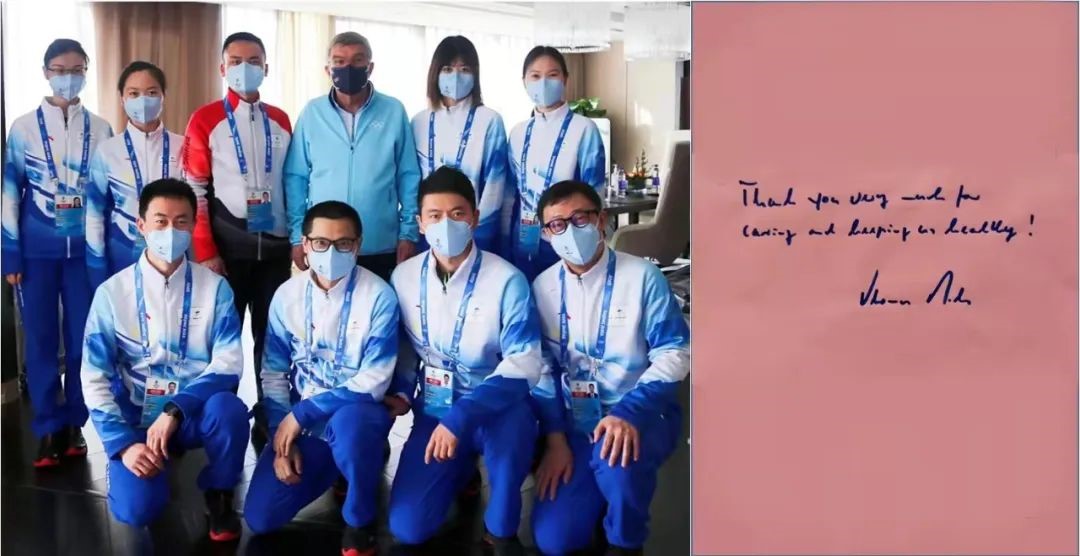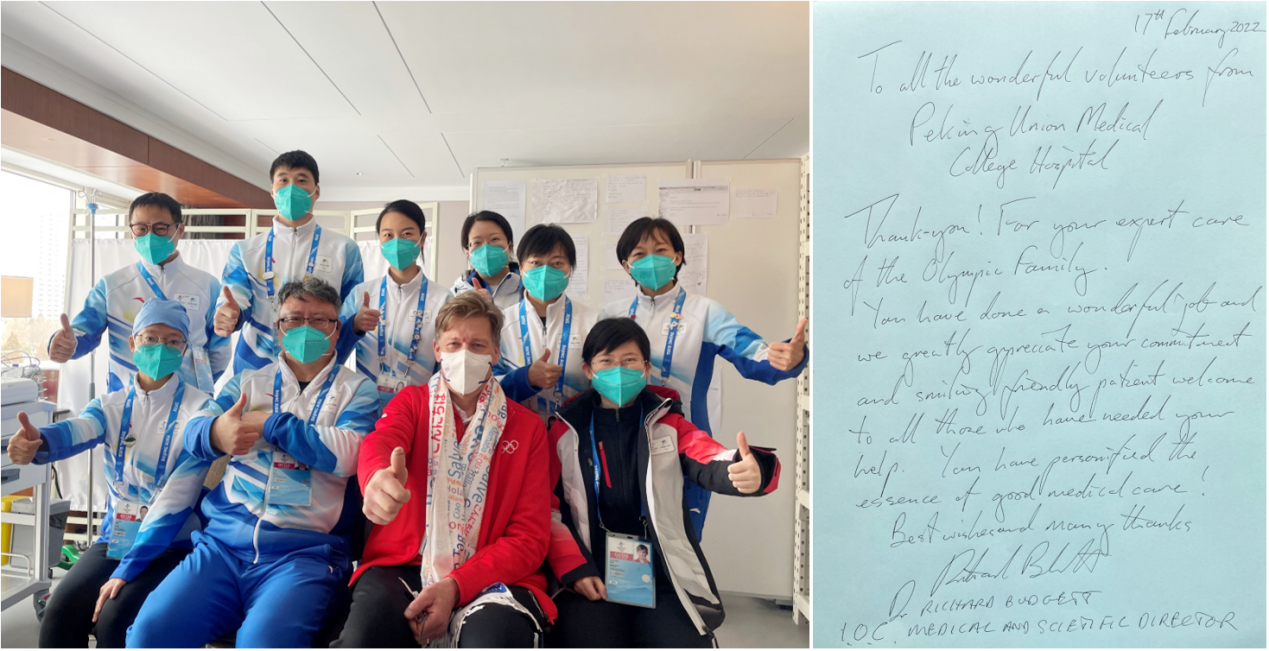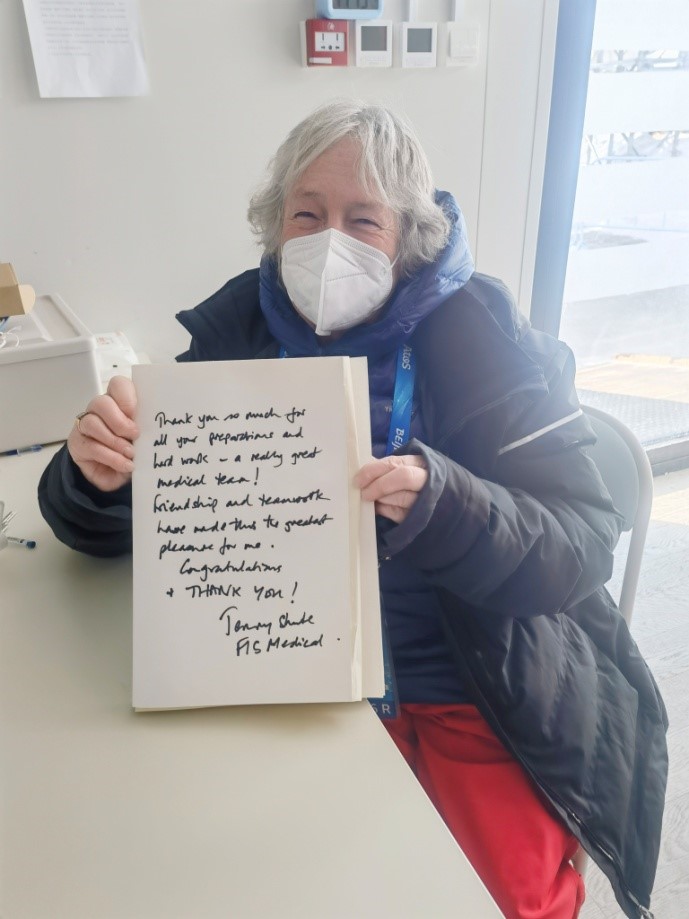This is a team that has won appreciation from Mr. Thomas Bach, President of the International Olympic Committee (IOC). “Thank you very much for your care that helps us stay healthy,” he wrote in the letter of thanks.
Mr. Christopher Dolby, Executive Director of the IOC Olympic Department, offered them profuse praises: “You are friendly and professional, and enthusiastic and decisive, competent and always smiling! You are true heroes!”
Mr. Richard Budgett, IOC Chief Medical Officer, said in the letter of thanks: “You have done an excellent job, and you are the representatives of medical excellence!”
The team consists of 128 people, among which there are “veterans” who have participated in voluntary services for two Olympic Games, as well as “recruits” under 35 years old. They are the PUMCH medical service team for the Winter Olympic Games, responsible for the most critical and core medical services tasks, such as the medical services in 4 medical service stations at venues, 2 Winter Olympic Wards, and 2 ski resorts, as well as that for expert groups at residences and at municipal level. This team has received 35 letters of thanks from various countries since it entered the closed-loop management system, which fully demonstrates that PUMCH is always trustworthy in the provision of medical services for major national events.
“Never received such good care!”
PUMCH participated in the earliest stage of bid to host the Winter Olympic Games as early as 2014. In March 2015, the IOC evaluation team conducted an on-site inspection and risk assessment on Beijing’s joint bid with Zhangjiakou to host the 24th Winter Olympic Games. Long Xiao, Deputy Director of the Department of Plastic Surgery, became the presenter of medical services with her fluent English and confident and dignified image, making contribution to China’s successful bid for the Winter Olympic Games.
PUMCH has engaged in the bid for, organization and hosting of the Winter Olympic Games. It set up a leading group and 5 working groups for the Winter Olympic & Paralympic Games, and the Winter Olympic medical services team is composed of 128 members to perform multiple tasks. PUMCHers have been highly recognized by IOC and the Beijing Organizing Committee for their high political stance, superb diagnosis and treatment, high-quality medical services, and thorough whole-process management, showing PUMCH’s capabilities and conveying the warmth of China to the world.
On February 2, 2022, an IOC official suffered from sudden chest pain. The medical service station completed the on-site rescue and emergent transfer in less than an hour, 30 minutes if time on road was deducted. The IOC officials who witnessed the entire rescue and transfer process gave a thumbs up to PUMCH. The medical emergency response mechanism with unified command, sound coordination, smooth operation, quick response and decisive handling has laid a solid foundation for the efficient operation of medical service provision and emergency response mechanism during the Games.
A foreign expert with a 13-year history of hypertension had blood pressure soared to 190/110mmHg due to work fatigue and climate, but his serum potassium was only 2.7mmol/L. The Winter Olympic Ward conducted a multi-disciplinary consultation, which not only helped deal with his intractable hypertension, but also found the most probable cause of this disease. Xu Kaifeng, Director of the Winter Olympic Ward, and Zhang Tian, Head Nurse of the ward, said that the Winter Olympic Ward would organize multidisciplinary consultations anytime, whether it is during the Spring Festival, weekends or at late night, and anywhere when it is necessary. Under the coordination of Vice President Du Bin, PUMCH has organized a total of 15 online consultations and 15 offline consultations inside and outside the hospital involving 10 departments. The PUMCH’s multi-disciplinary diagnosis and treatment mechanism once again played an important role in medical services for the Winter Olympic Games.
A hotel chef who showed the main symptoms of fatigue and chest tightness was quickly diagnosed with heart failure and promptly transferred to a designated hospital for treatment. ICU Physician Tang Bo went to Yanqing Hospital and stayed up all night, trying his best to rescue the critically ill foreign patient related to the Winter Olympic Games... The multidisciplinary cooperation and the coordination between the frontline and PUMCH have brought practical solutions to complex and difficult diseases. PUMCH received the praise of “Never Received such good care!” from the patients.
Behind the excellent epidemic prevention and disease treatment are the efforts from different parties. The average age of those working in the medical service stations at the venues is only 36 years. Medical Manager Shi Di and Medical Officer Chen Gang and Lin Chen are all under 40 years old, but they are responsible for the epidemic prevention and health of thousands of international guests and Chinese personnel. They are always thinking about treatment, drawing on experience from each case, and striving to improve every diagnosis and every step of treatment. Under the guidance of the PUMCH Department of Infection Control, the medical team created useful materials such as “Detailed Guidelines for Personal Protection” and the “List of Self-Prepared Drugs for Reference”, which were recommended to other medical teams at the venues by the Beijing Organizing Committee. The Department of Emergency, while sticking with epidemic prevention within its own scope and the Fever Clinic, sent out a competent team to support the medical services of the Winter Olympic Games. Zhu Huadong, Director of the Department of Emergency and Head of the Emergency Care for the 2008 Olympic Village, said emotionally: “14 years after the Beijing Olympic Games in 2008, PUMCHers are taking on this glorious mission again and will work for it relentlessly and bravely!”
Many backstage heroes have made unremitting efforts to offer every person in the Winter Olympic Games with safe, thoughtful and meticulous medical services. Wan Xuejun, Head of the International Liaison Department of the Communist Youth League, together with Medical Officer Chen Gang, met the Japanese Olympic Committee President Yasuhiro Yamashita and his delegation. During the meeting, President Yamashita highly praised the Olympic Games and the medical services. “The light of a small fire illuminates eternally”. The voice of ordinary people conveyed by the torch of the Winter Olympic Games will be one of the brightest light beams in the Beijing Winter Olympic Games.
“The Most Handsome Medical Team in the Winter Olympic Games!”
On February 7, 2022, the finals of both the men’s downhill final and the women’s giant slalom in alpine skiing were held at the ski resort Xiaohaituo Mountain in Yanqing. Among the more than 80 athletes, 23 had fallen down by the end of the first round. An American female athlete fell down hard, which caused an open comminuted fracture in her lower leg. The ski medical team rushed to the athlete, quickly carried out a detailed examination, gave emergency treatment such as analgesia and immobilization, and sent her to Yanqing Hospital for emergency surgery. She later thanked the medical team through her personal social media account.
This medical team, as the first ski medical team in China, is composed of Li Qiyi from the Department of Orthopedics Surgery, Deng Kan from the Department of Neurosurgery, He Jia from the Department of Thoracic Surgery, Che Lu from the Department of Anesthesiology, and Ren Guangwei from the International Medical Service of Xidan Campus. The injury rate of alpine skiers is close to 15%, while the golden rescue time is only 4 minutes. He Jia said, “The Winter Olympic track is covered with ice snow instead of powder snow, and we have to carry a 10-kilogram rescue bag, which is very challenging for rescue efforts during emergency stops and turns.” In order to reach the wounded within 4 minutes, the ski doctors participated in nearly 150-day professional training in skiing, emergency care on snow, helicopter rescue, and rope rescue four snow seasons in advance. The emergency rescue operations of ski doctors were broadcast on TV, sparking profuse responses on YouTube: “Great respect for these heroes, and this will be a great Olympic Games!”, and “I hope no doctors get injured, and everyone stays safe and healthy.”
In fact, almost every ski doctor suffered from pain and injuries to varying degrees in training and competitions. For example, Li Qiyi had knee effusion, patellofemoral arthritis, patellar wear, patellar contusion with bone marrow edema before entering the closed loop, and Deng Kan underwent surgery for left knee meniscus tear and anterior cruciate ligament rupture during skiing training. They did not back down. Instead, they participated in medical services throughout the Games, lifted themselves up with the fighting spirit of the Olympic Games, and worked hard to show the excellence of Chinese doctors.
Two special "duo" are observed in this journey: one duo is the two Olympics events Ren Guangwei signed up for as frontline medical personnel in 2008 and 2022 respectively; the other duo is Che Lu and her husband Zhao Minghao, who were both selected into the medical services team of the Winter Olympics in 2022 and joinly attended to the "Xuefeiyan" track at different venues. “This experience is definitely unique for us. As the first generation of Chinese ski doctors, we are very proud of contributing to the Winter Olympics.”
Che Lu participated in nearly 150-day training 4 snow seasons in advance, which could not have been possible without the understanding and support from her own department. Huang Yuguang, Director of the Department of Anesthesiology, fully supported Che Lu to serve the Winter Olympics by giving her more favorable terms on work arrangement and bonus. “They are serving the country, certainly our department should support them. I am proud of these young people!”
“Seeking Breadth and Greatness and Attending to Details”
Medical Manager Shi Di said with emotion: “The success of the Beijing Winter Olympic Games is attributable on the efforts of everyone involved.” “I am very fortunate to have PUMCH, the No. 1 ranking hospital for 12 consecutive years, as the designated hospital, and PUMCH is also where my medical team comes from. So far, any ‘unreasonable’ requests I have made have been accepted by PUMCH,” she wrote in her diary
This is the voice of team members working at the frontline. PUMCH has developed a mature organizational management structure through participation in medical services of many major events. The hospital has set up a Beijing Winter Olympic & Paralympic Games Leading Group, which consists of five working groups, that is medical services group, epidemic prevention and control group, hospital safety group, comprehensive support group, and comprehensive coordination group. PUMCHers have integrated the pursuit of excellence into every task, such as the preparation of plans and manuals, daily regular meetings, submission of daily safety report, fulfillment of job duty, training of epidemic prevention at venues, and drill of transfer of the critically ill, and provided high-quality and warm medical services for the Winter Olympic Games.
“No one has well enjoyed the Spring Festival holiday in the past few years...” said President Zhang Shuyang with tears in her eyes when seeing off the medical team. On New Year’s Eve, she celebrated the Spring Festival online with the team members at the frontline from 6 stations. “Have you eaten dumplings? Do not forget to call your family members to wish them a happy new year!” She was deeply touched by the team members who put their country first and braved the 4-month closed-loop management, and also felt satisfied with the excellent performance of the PUMCH team. “Those young people are excellent successors, and this is where PUMCH’s confidence comes from.”
At the mobilization meeting for medical services of the Beijing Winter Olympic & Paralympic Games held earlier, Vice Presidents Wu Peixin and Chai Jianjun handed over the hospital flag to the medical team members, and encouraged them to “keep the country in heart, shoulder the historic mission, and provide comprehensive, professional and strong medical support for this Winter Olympic Games with absolute loyalty, highly conscious awareness of thinking in big picture, extremely responsible work style, and dedicated professionalism”.
“The leaders of PUMCH are always concerned about the team members who are fighting on the frontline; they are aware of the difficulties of the team members’ families and help them through active coordination, to allow everyone to be focused on their work without any distractions.” Pan Hui, Director of the Department of Medical Affairs, believed that collective strength is an important weapon to overcome uncertainty.
The guest greeting pine welcomed friends from abroad whereas willow twigs waved a bittersweet goodbye. When the fireworks of “One World, One Family” bloomed over the National Stadium, the Chinese romance touched everyone inside and outside the venue. Outside the venue, the members of the medical service station were exchanging gifts with IOC officials and taking group photos. The skills and services of PUMCHers have been frequently praised and well respected. The story of spring continues, and there is no end to hard work. As the friendship is high as mountains and long as rivers, we will go forward hand in hand for a shared future.

IOC President Mr. Thomas Bach took a group photo with Chen Gang and his team, and wrote a letter of thanks

Mr. Christopher Dolby (middle), Executive Director of the IOC Olympic Department, took a group photo with Shi Di (through video), Chen Gang (right) and Lin Chen (left)

IOC Chief Medical Officer Mr. Richard Budgett, took a group photo with Lin Chen and her team, and wrote a letter of thanks

Jenny Shute, Vice Chairman of the International Ski Federation (FIS) Medical Committee, wrote a letter of thanks
Journalists: Chen Mingyan, Chen Xiao, Gan Dingzhu and Fu Tanping
Translator: Liu Haiyan
Editor: Wang Yao
